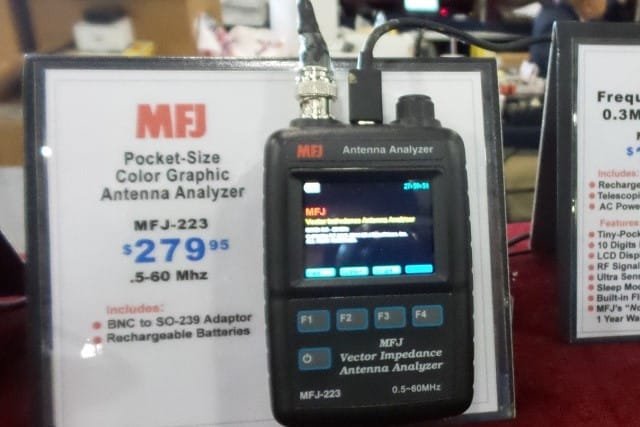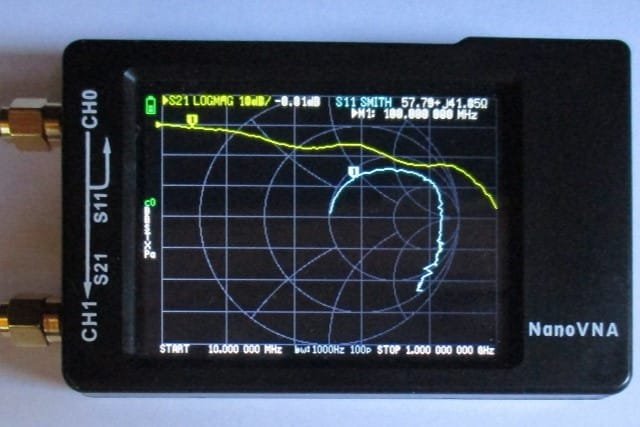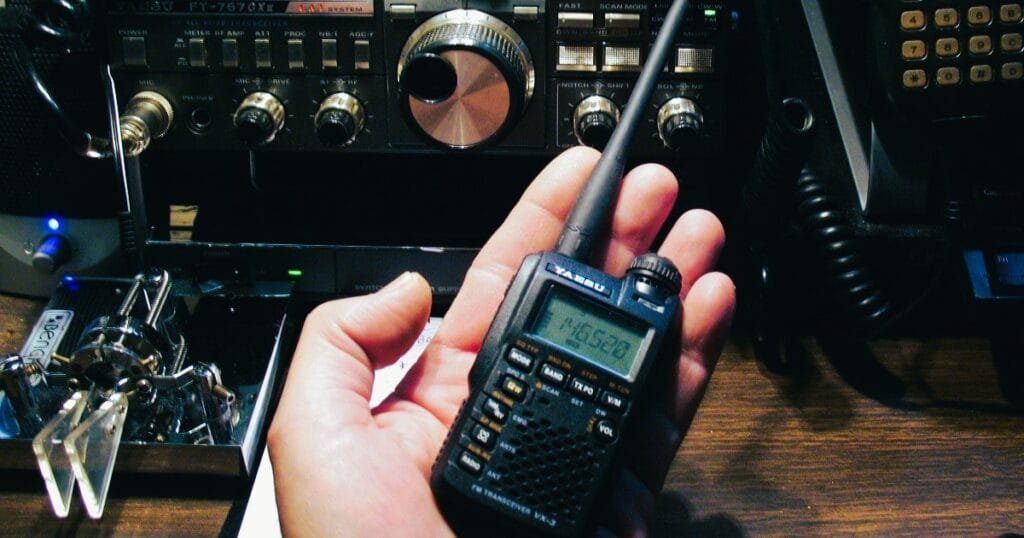Table of Contents
ToggleChoosing an Antenna Analyzer for Your Ham Radio Setup: A Ham Radio Essential
Welcome back to TalkieTrail. But for those of us who are long-time ham radio folks, the tale that I am about to relate will be one we have all heard before at some level or another; a sad story actually and on this dark rainy day in New England it seems entirely appropriate. Yes, you read it correctly. My trusty old analyzer finally died, after many years of hard work. Imagine my dismay! I stood there looking at the smoldering remains of what used to be a beautiful piece of equipment that I now needed replaced.
If you are curious about why you need an antenna analyzer in your ham radio setup. I will try to help you understand the basics of this. Also we will try to find out some best models of antenna analyzer available in the market and their advantages and disadvantages.
Discovering the Antenna Analyzer: A Journey into Precision
As a newly licensed amateur, getting into the hobby felt like being a kid in some fantastic candy store — there were so many gadgets around me all designed with specific uses, each pulling at my shirt sleeve competing for attention. In a sea of jargon and gadgets, the antenna analyzer was like Superman in glasses. Little did I know this silly little thing would not only improve my reception but suddenly make me look like a master of the radio dial.
Now, what is it that makes an antenna analyzer so special? In other words, it is your compound mate that helps in the perfect adjustment of antennas maintaining their high functionality. Whether you are on the top of a mountain or at your comfortable radio shack, an antenna analyzer is capable of giving precise measurements and helping you tune up your system.
Does An Antenna Really Help You Extend Connection? Click here to know more.
What Exactly is an Antenna Analyzer?

Perhaps you are wondering why am I excited so much on the antenna analyzer. Let me explain. With help of antenna analyzer we can measure the input impedance of an antenna which we are using for our ham radio or walkie-talkie. It helps you to collect some important data on standing wave ratio (SWR) impedance, and reactance No let all these technical terms drive you away! In simple terms, this tool makes sure your antenna is properly tuned to deliver the most amount of power from your transmitter. What was the result? Out in the field you can expect cleaner signals, greater distances and ultimately a lot less headaches.
Oh, and it’s a good way to keep from frying your gear — something I wish I would have known before mine bit the dust.
Why Every Ham Needs an Antenna Analyzer
By the way, why do we need the antenna analyzer just to live our ham life? Yes, you could. So trust me, once u have had one of these you would never go back. Benefits of this tool for any ham operator:
Precision Tuning
What it all comes down to is, you can only do so much with an antenna. An antenna analyzer gives you precise information which allows you to optimize performance of your antenna. Although guesswork is pretty good when you need it for cooking a batch of cookies but not if working to land that rare DX station.
Boosts Signal Quality
A properly adjusted antenna reduces signal deterioration and improves overall performance. Whether you want to communicate with a fellow ham operator down the block or across the world, the antenna analyzer is the key to achieving greater transmission and reception.
Repeater is also essential for boosting the signals of your radio device. If you want more details about amateur radio repeaters, types, setup, and coverage with top brands of radio repeaters, don’t forget to click here.
Prevents Equipment Damage
Poorly adjusted antennas can reflect power back to your transceiver, producing a variety of concerns, including equipment damage. An antenna analyzer allows you to detect and resolve any issues before they cause permanent damage. It functions similarly to a radio fortune teller!
Choosing The Right Antenna Analyzer
Now that you know why an antenna analyzer is crucial, how can you select the best one? You can choose almost anything in this market, each option a little different. When making your choice, here is what you should look out for:
1. Frequency Range Matters
Frequency range is first You should have an analyzer that is used to the frequencies you commonly use. Make sure the analyzer covers your frequencies of interest on HF, VHF or UHF bands. Your life is similar to a pair of shoes—if they are too small, you can hardly put them on and if they are biggish ones—they will always trip you up.
Not sure what you can hear with your ham radio? How about the frequency your ham transceiver can do? Don’t worry. We will show you the way. How to get the frequency list of your device. Click Here.
2. Key Features to Look For
Digital Displays: If you’ve ever tried reading analog meters in poor light, you’ll understand why a digital display is so helpful. Clear, easy-to-read numbers make your life significantly simpler.
Graphical Analysis: Certain devices provide visual representations of SWR or impedance over a range of frequencies. This might save you time by demonstrating where your antenna operates best.
Portability: If you perform a lot of fieldwork, a portable, handheld antenna analyzer is the ideal option. Compact variants make it simple to diagnose and adjust your antenna configuration, whether you’re on a mountaintop or at a campsite.
PC Connectivity: Many current versions include the possibility of connecting to a computer for more extensive analysis. This function transforms your antenna analyzer into a full-fledged data collecting tool, ideal for individuals who wish to delve deeply into their antenna’s performance.
3. Budget—Invest Wisely
Antenna analyzers may cost anything from reasonably inexpensive to “Are you kidding me?” costly. While it may be tempting to go with the less expensive choice, keep in mind that your analyzer is an essential component of your ham radio equipment. Spend wisely—purchase a high-quality analyzer upfront to avoid future hassles.
Top Antenna Analyzers on the Market

Now, let’s have a look at a few antenna analyzers that have captured my attention. Whether you’re just getting started or an experienced operator, these models are worth looking into.
Mini1300 HF/VHF/UHF Analyzer
Mini1300 A very small, but a very powerful antenna analyzer of the present time. Range from 0.1 MHz to 13 MHz That is perfect for those who need tools that can offer versatility and mobility.
Key Features:
- Capacitive touch screen for easy operation
- USB and internal power supply options
- Multiple modes: Single point measurement, Scanning (Frequency Sweep), and TDR Mode
- Portable and easy to carry, making it ideal for fieldwork
Why I Love It
Disadvantages
- Wide frequency range
- Touchscreen interface for easy navigation
- Small and portable—ideal for fieldwork
- Slightly expensive
- Capabilities might be excessive for an occasional user
MFJ 269DPRO HF, VHF And UHF Antenna Analyzer
The MFJ 269DPRO antenna analyzer is a great choice for ham operators who want a simple but effective tool as their antenna calculating gadget. This robust analyzer covers a wide frequency range and provides accurate, clear readings. This robust analyzer covers a wide frequency range and provides accurate, clear readings.
Key Features:
- LCD display and side-by-side meters for clear readings
- Covers a wide range of frequencies, including HF, VHF, and UHF
- RF signal generator and CoaxCalculator technology built-in
Why I Love It
Disadvantages
- Durable and rugged
- Built-in frequency counter
- Large, clear display
- Bulky and less portable
- Lacks modern features like graphical analysis or touchscreen
Vector NanoVNA Analyzer
The Vector NanoVNA is an absolute steal for the operator on a tight budget. It’s inexpensive, covers frequencies up to 1.5 GHz, and offers a fairly comprehensive feature set for the price.
Key Features:
- Measurement frequency range from 10 kHz to 1.5 GHz
- 2.8-inch TFT display for clear visuals
- Type-C USB interface for easy connectivity
- Super portable—just 85mm x 54mm
Why I Love It
Disadvantages
- Budget-friendly
- Portable and compact
- USB connectivity for detailed data analysis
- Smaller display
- Fewer features than higher-end models
Antenna Analyzer: A Critical Tool for Ham Operators
An antenna analyzer is a must if you want your amateur radio system to function at its highest level. Whether you’re a veteran operator or just starting out, an analyzer can help you comprehend and fine-tune your antenna like an expert. However, like with any instrument, selecting the proper one involves an awareness of your requirements—frequency range, mobility, and affordability are all important considerations.
Conclusion: Your Antenna Analyzer Is Your Best Friend
What am I to conclude from my ham radio journey but the realization that antenna analyzer is not a gadget; in fact, this thing sits right there on your shack and adds genuine value to make your entire life with radios easier. This is an instrument which can ensure accurate tuning without damaging expensive instruments. It turns your guesswork into certainty, and lets you excel in anything from casual banter to high-stakes DX hunting.
So what do I think? Well to anybody who thinks they may need an antenna analyzer: yes. This not only will increase your overall performance, but it will also brand you the person to go in and rounds of fine-tuning or to discover a fix for an issue around your ham radio circle.
As you plan for your next adventure, do not leave behind the antenna analyzer. Good tuning and clear signals!


